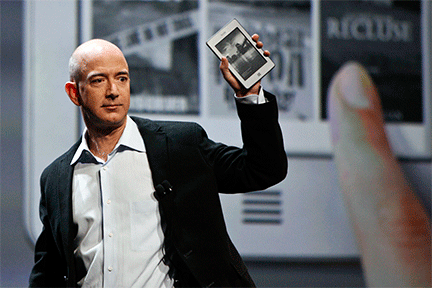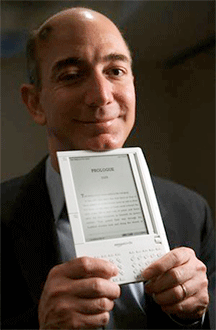
“Will you be a cynic, or will you be a builder?”
—Jeff Bezos
By Melissa Fares
The “ultimate disrupter” is at it again. Jeff Bezos (ΦBK, Princeton, 1986), founder and CEO of Seattle-based Amazon.com, seems to be not just the talk of the town, but rather the world, in light of his recent purchase of The Washington Post from long-time owners the Graham family. That seems appropriate, given the power of the internet to globalize information and opportunity. And nobody knows that better than Bezos. The stunningly successful entrepreneur who personifies the power of the new internet economy bought The Washington Post for $250 million from the Graham family in August 2013. The purchase, which has sent shock waves through the newspaper industry, suggests much about the evolving world of news publication and speaks to the visionary ambitions of a man heralded for his willingness to change the way the world operates.
While Bezos’ ownership of Amazon illuminates how the new internet economy works at its best, the purchase precedes a challenge in light of the travails of traditional newspapers in this different world. The tension between print journalism and its digital descendant suggests that there are questions to be resolved, as major papers have struggled to adapt to the realities of the twenty-first century. Bezos’ purchase might make an investment-conscious capital world question why the digital pioneer behind the world’s largest online bookstore would take on his shoulders a print news organization that has reportedly suffered a 44 percent drop in revenue over the past six years. Although many are skeptical of anyone’s ability to save print media so late in the game and given the numbers, Bezos seems like he’s happily accepting the challenge—with confidence.
With a degree from Princeton University in computer science honed by work after his graduation, Bezos founded Amazon in 1994 after noting that internet usage was growing at 2,300 percent per year, a statistic that caught his attention and suggested the possibilities for an entrepreneur clever enough to read possibilities into this new economic truth. Bezos’ willingness to take such a chance would eventually translate into his greatest professional achievement. But it’s also clear that Bezos isn’t done yet either, as a series of ventures including a space travel startup seems to suggest there’s much more to come. Bezos, who himself likened the rise of the internet to a gold rush, apparently understands what it means to poise oneself for success in a changing world.
While critics have lamented the negative implications of Bezos’ disruption of the traditional economy, the simple truth is that such evolution seems to reflect the very nature of capitalism and society. Such patterns of “disruptive innovation” have long existed, as technological improvements and infrastructural changes have sought to bring consumers increasing affordability and access. The big-box stores that supplanted small-town businesses in the last generation now face their own challenge in the form of Amazon and its online retail contemporaries. What this might suggest for the future of The Washington Post isn’t clear at this point, but Bezos doesn’t appear daunted by the bleak outlook others have projected for the newspaper business.
At his very core, Bezos reflects the old adage, “nothing ventured, nothing gained.” Said the forty-nine-year-old of his inspiration for the massive Amazon, “The idea of building an online bookstore, with millions of titles, something that simply couldn’t exist in the physical world, was very exciting to me.” He also spoke passionately about the importance of personal partnership, talking about the support he enjoyed from his wife, Mackenzie, also a lover of the written word, and how she encouraged him to pursue his brilliant, though clearly risky, idea. The rest is, well, the present. And this present time, one of overnight deliveries and little brown boxes of satisfaction, has Bezos’ fingerprints all over it.
Bezos and those who know him well say that he has always been a lover of the written word, a disposition that suggests real meaning behind Bezos’ recent investment. A Bloomberg Business article from August 8, 2013, retells the story of Bezos banishing PowerPoint from all Amazon meetings and insisting that “a narrative document that outlined the topic being discussed” be distributed to all members of the meeting. That in itself speaks volumes about Bezos’ passion for print, and it illuminates bright possibilities for the future of The Washington Post.
Behind the entrepreneur and business giant apparently stands a man whose words and actions suggest a deep appreciation for humanity. During his 2010 commencement address at his alma mater, Bezos spoke of the difference between gifts and choices. “Cleverness,” he says, “is a gift.” “Kindness is a choice.” This recognition of the power of personal choices rooted in deep personal beliefs apparently lies behind his understanding of the power of both capitalism and philanthropy.
“Will you be a cynic? Or will you be a builder?” Bezos asked the soon-to-be Princeton grads. “When you are eighty years old, and in a quiet moment of reflection, narrating for only yourself, the most personal version of your life story, the telling that will be most compact and meaningful, will be the series of choices you have made. In the end, we are our choices.”
The Washington Post is a proud paper, resplendent in triumphs such as its leading work in The Pentagon Papers and the Watergate stories. And it has faced journalistic in addition to the economic woes that threaten major print newspapers in this day and age. How will The Washington Post adapt to this changing world? Bezos, who has had his own professional struggles, might well find resonance in this notion. It seems as though his philosophy about making decisions, following through, and forgetting about failure, should set the stage for other innovations and innovators to come, one of which will apparently involve the future of The Washington Post.
Melissa Fares is a senior at Smith College majoring in psychology and minoring in art history. She is the associate editor for Smith’s newspaper, The Sophian, and has her own blog titled Womankind. Her writing has also appeared in Newsweek, The Daily Beast, FinerMinds, India Times, The Dallas News, and more. Smith College is home to the Zeta of Massachusetts Chapter of Phi Beta Kappa.




